If only bestselling authors were employers
An intentionally browseable set of weeknotes for my previous week1.
I worked:
Cynefin, the sense-making framework, was covered in a personal introduction by Greg Brougham, which I was able to access as part of my membership of Liminal. While I’ve read or watched introductions to Cynefin before, to get a rough idea of the core concepts, this was more of a personal view. It covered the origin of the concept, and what appealed to Greg about it, some of which I understood, some of which I needed to read up on. But - as with much other systems thinking, and conceptual advances in general - I was struck by how much of the knowledge and theories were attached to their main creator, or to a single book or other piece of work. Personally I’m both aware of how much those concepts, and their authors, must owe to the team around them - and also I tend to be far more interested in the concepts than the people, so the strength of that link feels like unnecessary baggage.
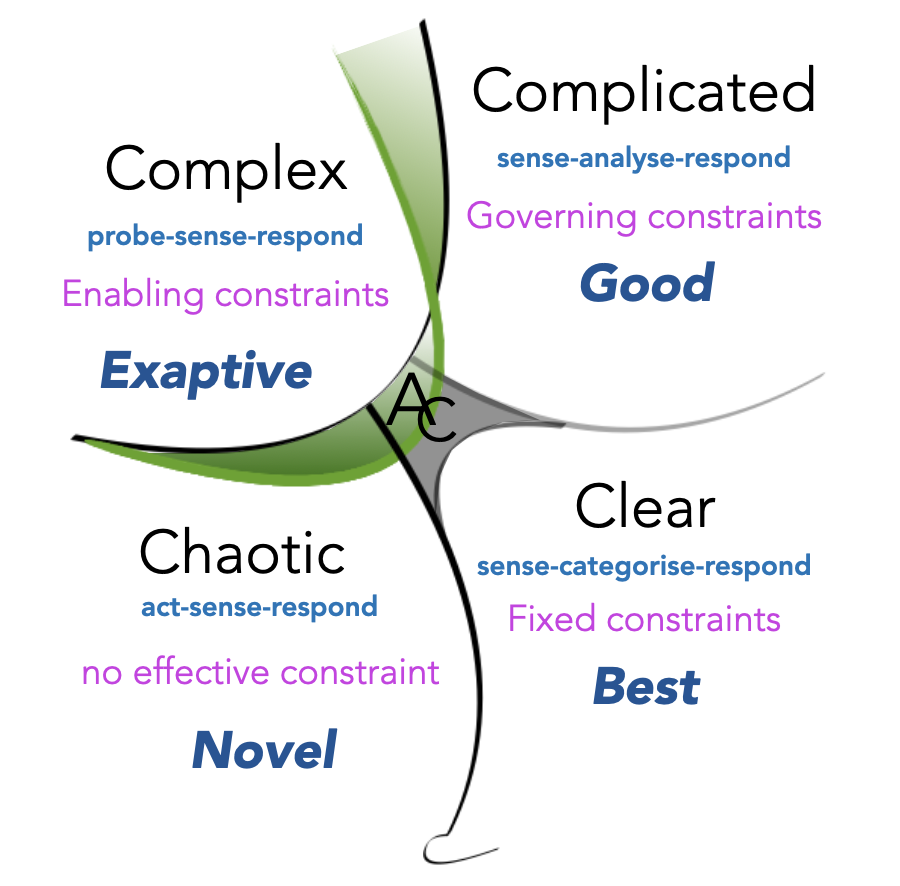
The Cynefin Framework
I helped simulate the Earth as one of the Control team for Bad Moon Rising. This was a megagame based in an alternate history of the world, set in the 1970s during the Cold War. If you’re not familiar with megagames do watch this video, or think of a “megagame” as just being a board game or tabletop role playing game, except with anywhere from 20 to 300 players, with the “Control team” being the equivalent of a GamesMaster or Dungeon Master for it all. In this alternate history the USSR, China, USA, UK, and France had all made it to the moon by 1975, established moonbases, and were currently exploring looking for a mysterious new resource called Red Mercury that promised considerable technological advances.
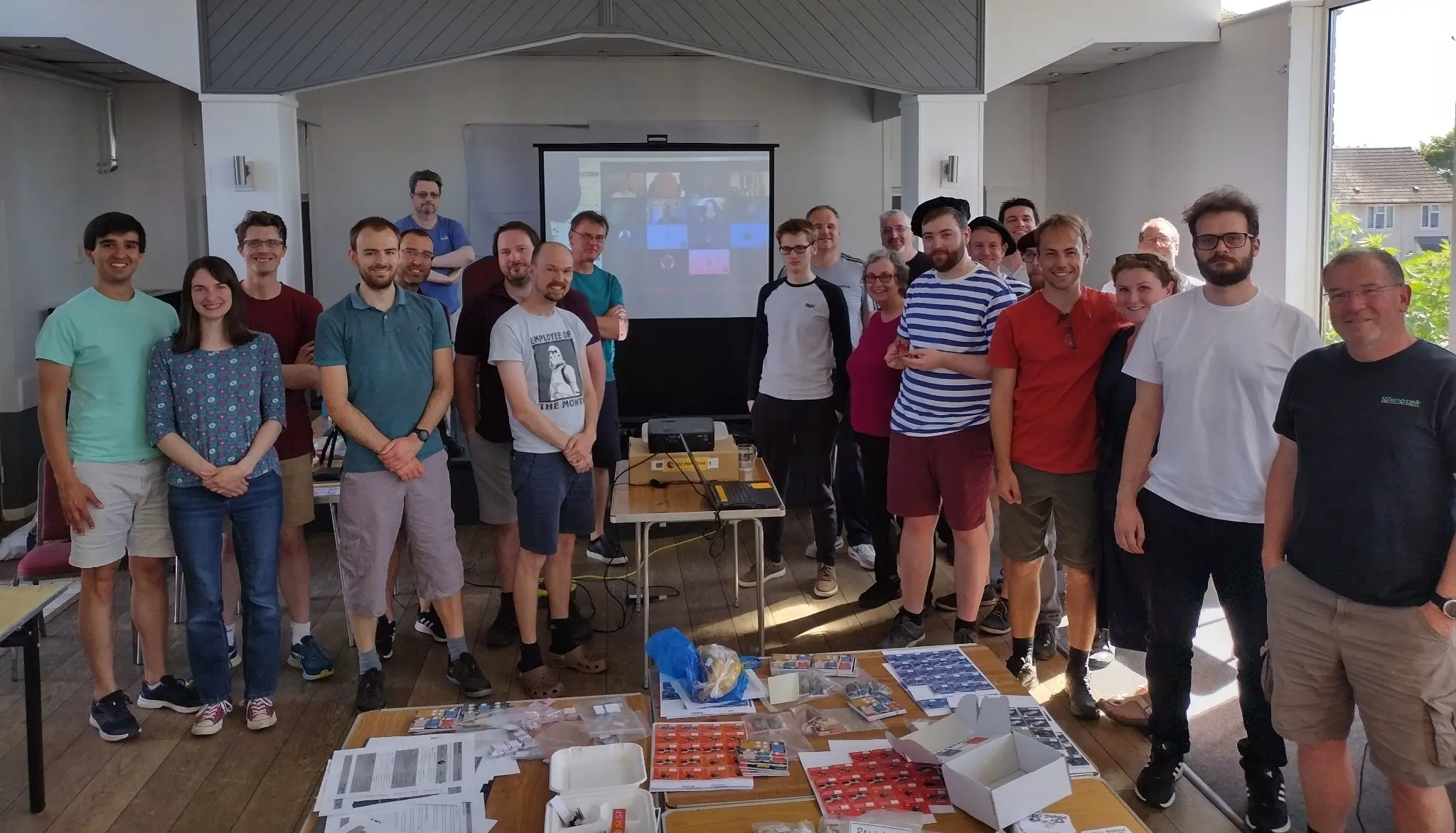
The first truly hybrid megagame? ( Discord server on the screen at the back )
This particular version of the game was “hybrid”, meaning that all the players representing their country’s military or civilian presence on the moon were located in Moredon Community Centre in Swindon, but all the players representing their counterparts on earth were located on a Discord server online. With dedicated laptops available on Moon/Swindon, as well as personal devices of course, the moon based teams could communicate with their earth based counterparts to request supplies, take orders, discuss strategy, and so on.
As always with megagames, a difficult but enjoyable experience to manage as part of Control, and I was really pleased to see how well this experimental hybrid format worked - lessons learnt over the last few years by the gaming community ( and especially the people I work with on this ) on how to make the most of online and hybrid settings really paid off. The benefit of hybrid setups is definitely something I need to write about separately, as I think there are many implications for the kind of exercises I run in a work context. Of course, as this was a hobby experience, some megagame players naturally lean to the imaginative and have fun with the scenario… for example the French team shipping the Mona Lisa to the moon for the first art piece in space, with a game-piece that needed to be improvised…

Moona Lisa
Does the pipeline go into the funnel, or the funnel into the pipeline? It’s been great having a sales funnel that is recommendations from friends and contacts for potential customers to contact me, but going forward, in increasingly difficult economic times, that’s going to be unworkable. Also I need to make it easier for people to understand what I’m capable of, therefore I need to do more business development than previously.
I consumed:
Range by David Epstein is a particularly good book. Well written, well researched, well referenced, easy to read, and uncommonly proficient at extrapolating from individual stories to make general points, but justifying that extrapolation through citing the work of others. If you identify as a “generalist” ( whatever that means ), or hire people, or offer career guidance ( especially as a parent ), do make time to read it. Overall the work makes the point that generalists, those who haven’t specialised in a single domain of knowledge, are useful when creativity and innovation is needed, or when wicked problems need to be solved; that generalists can have ideas that are simply inaccessible to specialists.
Of course there’s much more nuance than the paragraph above, and you should get the book to explore the detail. Its overall point is something I’ve argued before, and have firmly agreed with for considerable time - and I’m confident/arrogant enough to think it seems obvious. I don’t think I’m biased because the book says what I want to hear, I think it just approaches the question in a particularly well constructed way. Striking for me was the early distinction between “kind” and “wicked” domains, the former being relatively simple environments such as chess where specialist knowledge and repeated practice is preferable, but with wicked domains being everything else that doesn’t match that description. And for me that’s where the most interesting problems are.
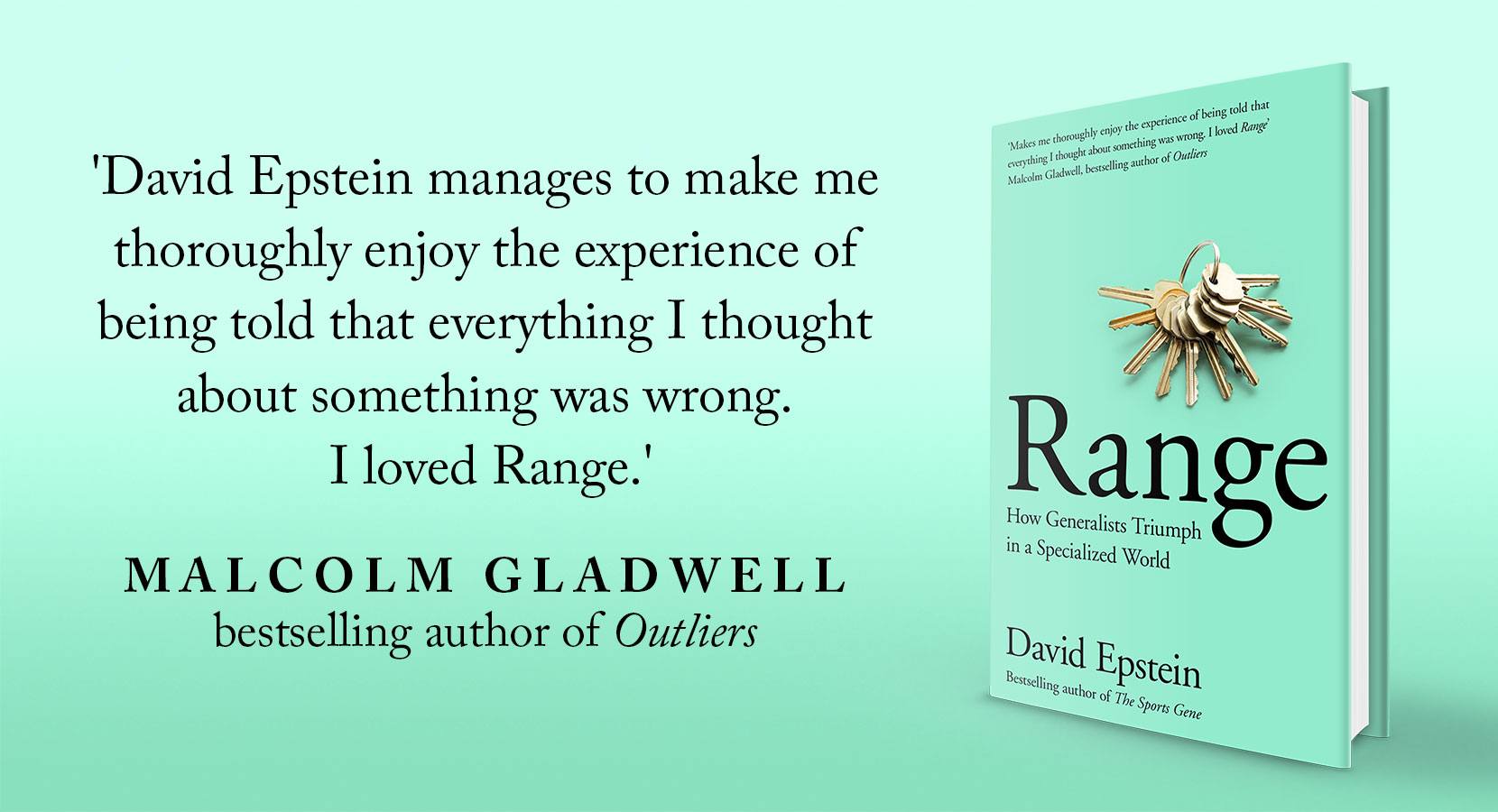
Range by David Epstein
The book is full of helpful references, I enjoyed being introduced to, or reminded of2, such useful concepts as: Moravec's Paradox, Cognitive Entrenchment, interleaved learning, solution finding through analogy - especially the company InnoCentive, the Einstellung Effect, and more… most notably the reminder that one of the first people accused of being a “jack of all trades” was Shakespeare, who I think we can judge as a success.
I’m very much a generalist, I see distinct advantages in taking ideas and concepts and strategies from different domains to solve wicked problems in your current one, and come up with new solutions. But I’ve seen Epstein’s point of view espoused often, and enthused about academically or intellectually, but remain absent from hiring or contracting practices3; so while I’m convinced he’s right, I’m not convinced his research will make a difference to the established ways of thinking - I have kind of heard it all before.
Also it should be stressed how interchangeable “generalist” is in the book with “late specialist”. To me the best set of definitions of how to classify your generalist tendencies is Emilie Wapnick’s work on multipotentiality, this is a good summary of her definitions.
Mr. Driller Drillland - is a very Japanese game I’ve played on the Nintendo Switch. It was originally for the GameiCube twenty years ago, but the core mechanics are timeless. It’s a kind of “reverse tetris”, you drill down through coloured blocks, creating gaps that might cause the blocks above them to fall… which you need to avoid as you try to reach a pre-determined depth, collect a number of items, or other goals within the game’s many different versions.
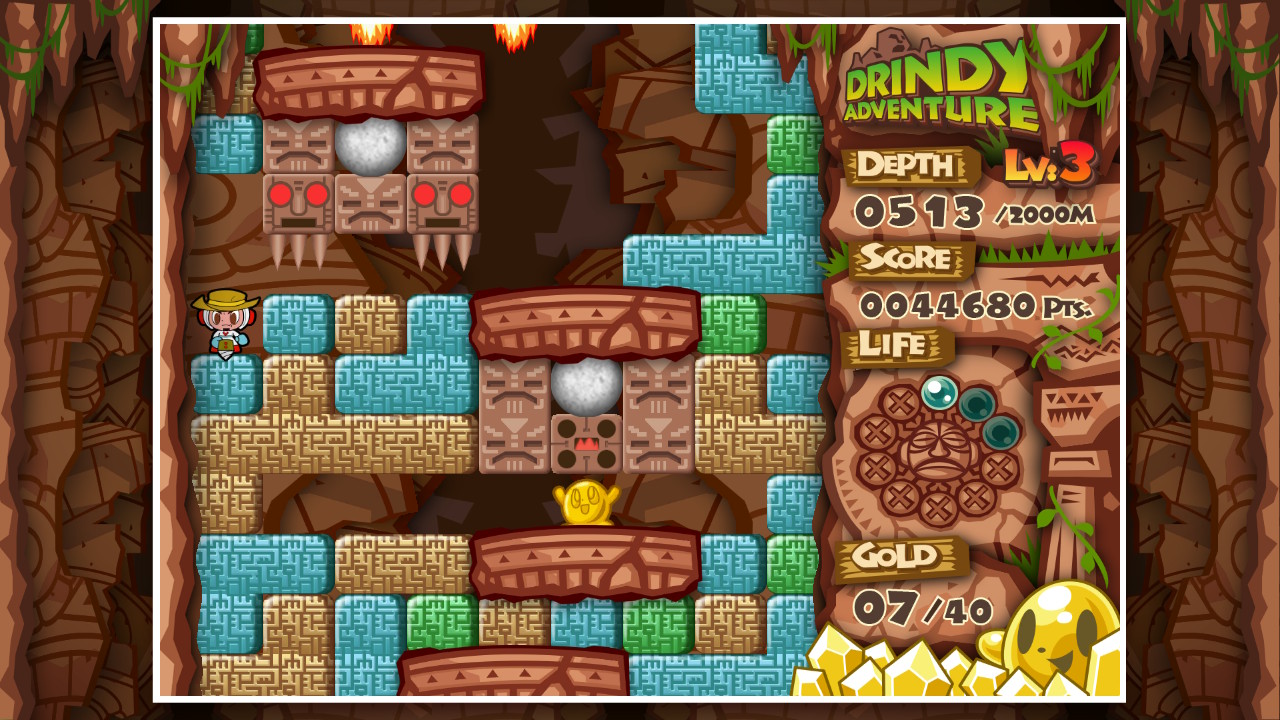
If falling blocks match enough of the same colour as they fall, they vanish; if not, they're coming your way.
I really enjoy this game, and the variety of modes it has. And also its thought provoking to see how quickly your play style needs to go from being quite slow and tactical when thinking about which block to drill, and the cascading effects of that on blocks you can see or you know you’ve passed before… to a completely different rapid and twitchy style needed when many blocks start falling or you desperately search for air - needed in some modes for your character to keep playing. Fun… but I am playing it on Casual Mode, which doesn’t feel very casual at times.
Interesting to think about strategically too, especially as in a lot of the game modes you need to grab air to survive as you descend the levels, but air is usually surrounded by “X blocks” that cost considerable time and air to break. But, depending on the game mode, those X blocks will vanish if they’re connected to enough identical blocks…

That precious air, surrounded by those X blocks.
…so do you keep a supply of those “X blocks” falling with you, to remove their counterparts when you encounter them? Or do you keep burrowing under those blocks to free up the air canisters you need to pick up, but risking being, well, squished? Always the sign of a good game, impressive complexity from the combination of relatively simple mechanics.
Snug Finder is cute, and recommended if you’re looking for a cheap “hidden object” game to relax to… even though it has a timer… this game is lovely, and has a soothing soundtrack. Similarly, also from second hand experience, check out the Faircroft Antiques games for a gentle mental challenge.
Disneyland’s Forgotten Sci-Fi Rock Band - Live From the Space Stage (Full Documentary) - if that title doesn’t have you racing to this link then… well, I was going to say this documentary isn’t for you, but actually it probably is for you. I strongly recommend giving it a try, for many reasons: firstly it’s just an interesting piece of culture, to see what it was like within early eighties Disney to create and advocate for Halyx, the “Sci-Fi Rock Band”. Also it’s a really well made documentary, which focuses on the band and the fans and the organisation and the process, when the modern style of documentary tends to centre the documentarian. A significant part for me is that it’s all too rare to see a representation of something that should have worked but that did not succeed, to see how important fate or luck or timing can be; as a contrast to our “hustle culture” where failure just means you didn’t try hard enough, and we only ever talk to the successes.
Also, the band does rock.

As is only right and proper, I don't think there's an ironic sneer during the entire documentary
The Undeclared War - Channel Four’s drama about a cyber-attack on the UK, was a lot better than expected. I had all my weary cyber snark ready for the #TheUndeclaredWar hashtag on Twitter if it was the programme I expected it to be, but instead I found it very affecting, very well made, and I loved the visual metaphors for technical action. I liked that the cyber effects were a backdrop to people’s stories and personal concerns, I liked that the different people were individuals - the TV producer, the Russian journalist, the Russian hacker in particular - driven by personal agendas or concerns or caught up in events rather than just “we need a baddie”. Also the technical detail was good with minor irrelevant errors, and maybe some of the procedures were off, but not to the extent that it mattered to someone in the cyber security industry like me; I was pleased to see so few commentators on twitter trying to score clout points by highlighting issues.
As I say, I particularly liked the use of visual representations of hacking or programming or thinking, this quotation from a Guardian review puts it well:
Creator/director Kosminsky (The Government Inspector, Wolf Hall) has done something masterly here: he’s taken a cold, hard subject – geopolitical cyberterrorism – and, within six episodes (all on All 4), made it accessible, gripping, frightening. He also manages to make coding – brainiacs tapping away on computer keyboards – dramatically viable. As TUW opens, Saara (Hannah Khalique-Brown) is taking a computer test, but it’s depicted as though she is a video game avatar, a gadget-wielding Lara Croft, later viewed throwing balls against walls in frustration at being assigned grunt work. What sounds like talking down to viewers (Cyber-attacks for Dummies?) actually engages us, using a mashup of technology and character to do it.

I genuinely hope these visual metaphors are how online activity is portrayed in future.
Monster Hunter the film was… alright. Not “so bad it’s good”, but also not very good. It’s yet another video game movie, with all the disappointment that usually comes with. The CGI is good enough, everything else is underwhelming. I’ve not played the game, maybe the references would mean more to players? Although going by this recommended IGN review maybe people familiar with the game behind the film would be disappointed as well? I’m particularly disappointed at being disappointed, if you see what I mean, because I’m always intrigued by how real world protagonists would react in this situation - partly how does military doctrine apply when you’re fighting what is essentially a dragon, partly how would people react when their understanding of the world is turned upside down as they travel to another world. I realise it’s a little specific to the way I view fantastical films like this, but this film answers none of those questions in any way at all.

I was unjustifiably exasperated at the Sentry E-3D's failure to detect a dragon
Struthless gave me a shock. They’re an excellent youtuber and artist, and put this video together on procrastination and creativity and measuring your output. As someone with many half-complete ideas I’m familiar with this advice, but for some reason this time it particularly hit home - especially the concerns that your “mortal self will ruin your perfect idea” and the encouragement to “just create something bad” to put your work out there and receive feedback. Partly inspired by this you will hopefully be seeing a lot more from me in future, regardless of my perception of its quality.
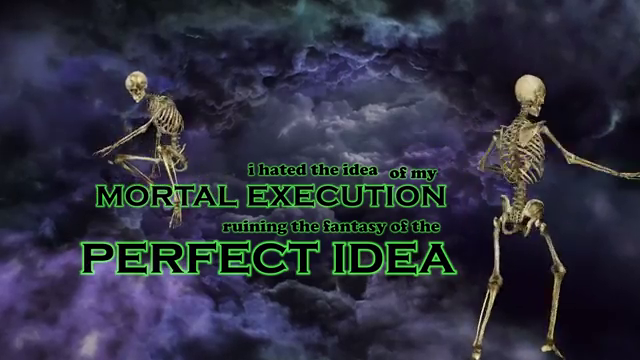
Ouch.
( Similarly check out this clickbaity but useful piece, it’s interesting to consider how many revered creators have so much ignored work, and ignored because it’s bad. )
A Kids In The Hall binge one evening, watching the last four episodes of the series, was a choice I made. Funny but dark but weird but funny for about two hours straight was a lot. Do try at least one episode if you did or didn’t like their work from back in the eighties; I think it’s a relatively unusual style. I hope to see at least one more series out of them, but maybe I should space out my viewings.
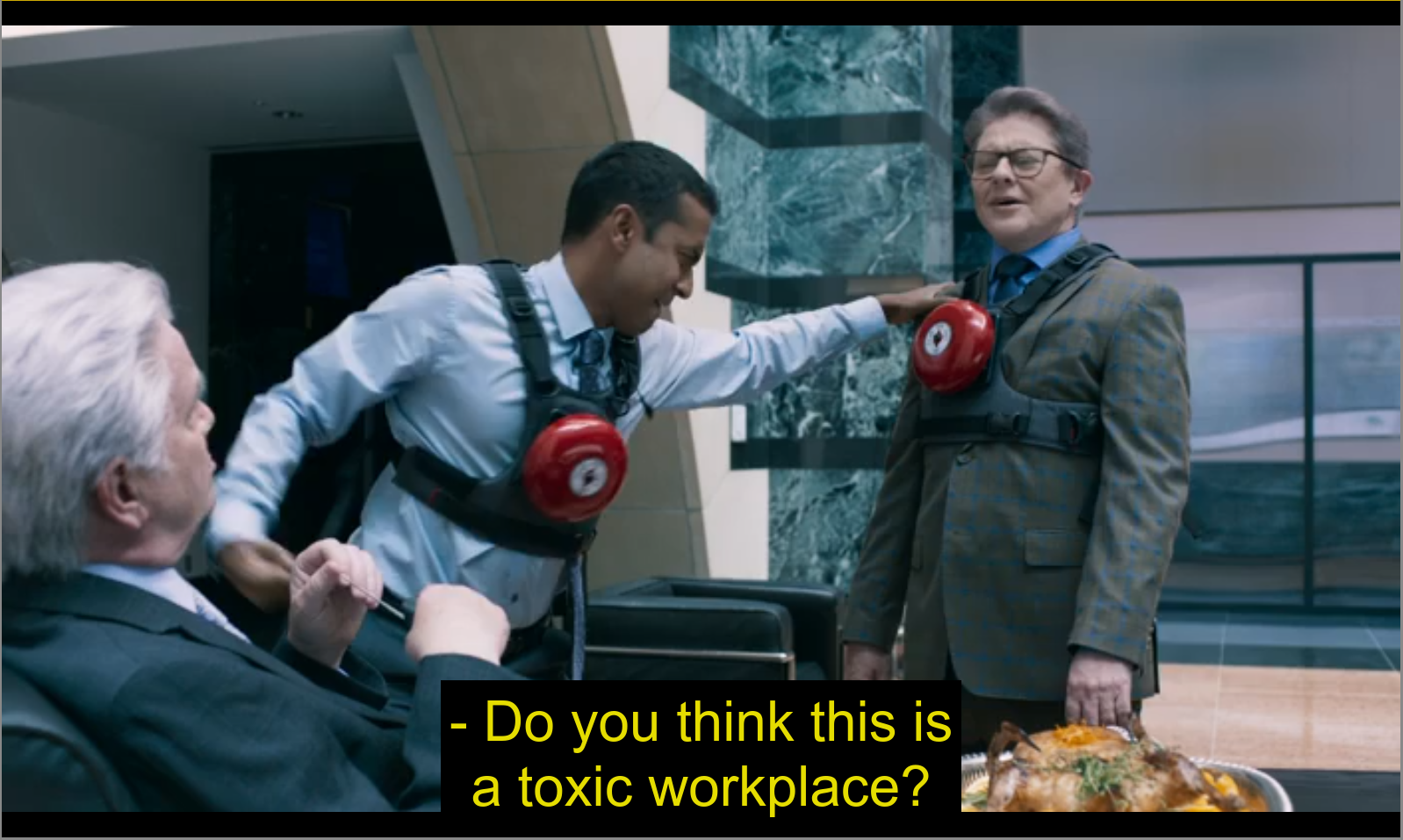
Dark. So dark.
What The Golf? is… is a game and a half. Good, imaginative, particularly if you don’t usually like golf or golf games, or do like puns. The variable difficulty of some of the “holes” was perturbing at times but anything not for you can be mostly avoided unless you’re a completeist. If you like skills based gaming beyond “what if you had a gun” themes do spend a minute watching this trailer4.
April and the Extraordinary World / Avril et le monde truqué is an enchanting animated film. Covering an alternate timeline where in 1941… let me quote the official description:
The world is radically different from the one usually depicted in history. Napoleon V reigns over France, where, like everywhere else on the globe, scholars and scientist are mysteriously disappearing, depriving humanity of major inventions. This has been going on for seventy years. Unaware in particular of the radio, television, electricity, aviation, and the combustion engine, this world has got stuck in out-of-date technology, as though slumbering in nineteenth century knowledge, governed by coal and steam. In this strange world, April, a young girl, sets out to find her scientist parents, who have disappeared. April is accompanied by Darwin, her talking cat, and Julius, a young street urchin. This trio must cope with the dangers and mysteries of this Extraordinary World. Who has been kidnaping the scholars and scientists for decades? And for what sinister purpose?"
The trailer isn’t great for avoiding spoilers, but that’s not much of a problem if you don’t speak French.
Loot, a new series on Apple TV, was less dark than Kids in the Hall above, but still has an edge to it - covering a very wealthy woman adapting to… “a new situation”, I don’t want to spoil it. It rightly rests on the talents of Maya Rudolph to manage the difficult space the central character inhabits, as a character you’re only sometimes sympathetic too; but has a strong cast throughout. It prompts many thoughts about money and happiness, even in this fictitious setting it seems to accurately simulate how weirdly miserable wealthy people are. I particularly liked the usage of this property which I’ve seen before ( and which is now sold according to a much shorter video).

Loot.
I thought:
As a complete about-face to last time, I should and will stop trying to catch my ephemeral thoughts to list them here, and keep them to Twitter instead.
I also:
Read some markdown documentation again and decided footnotes are something I should use more often5.
Wondered if I should keep track of the things I say I’ll do in these weeknotes, and see how many I achieve. I’m unnecessarily hard on myself when I’m just more vulnerable to the planning fallacy than most, and even then I’m conscious of how much time I spend in different quadrants of the Eisenhower Matrix.
Epilogue:
The summer genuinely makes me sad, currently pining for the Autumn.

Imagine me as the literal opposite of this.
-
In weeknotes terms a “week” is the time period between when I last wrote my weeknotes and now. ↩︎
-
I keep intending to put in the required work to create a Zettelkasten or Second Brain that stores my notes from books like these, but right now it’s just a text file. ↩︎
-
But do check out Generalist World if this sounds like you. ↩︎
-
In relation to the footnote above, my argument that cyber security isn’t like golf doesn’t apply if golf looks like this game. Once in-person presentations become safer, maybe that’s a fun angle to take. ↩︎
-
This is a footnote. I intend to use these for side thoughts until I get sidenotes working. ↩︎
